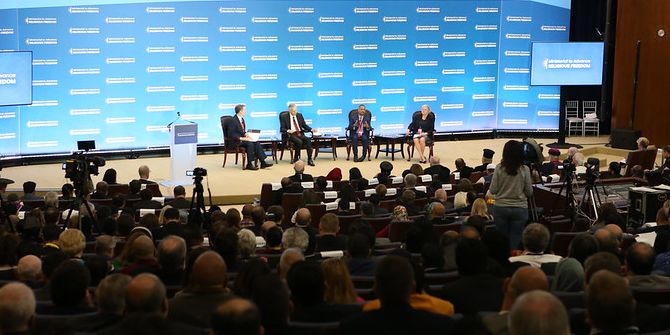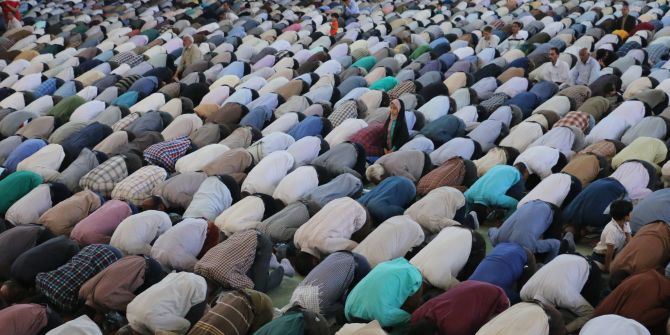In his new book Finding Faith in Foreign Policy, Gregorio Bettiza explores how and why religion has become, since the end of the Cold War, an ever-more-explicit object of American foreign policy. He identifies an inherent Christian bias that runs through much of this work, particularly with regard to promoting international religious freedom, and offers some ideas on how this bias can be addressed.

Over the past decades and across a diverse range of presidencies, new offices, appointees, strategies, and initiatives have been put in place by the United States to monitor religious freedom and advance it globally, draw on faith-based organizations to deliver humanitarian and development aid abroad, fight global terrorism by seeking to reform the Muslim world and Islamic theologies, and engage with religious actors to solve conflicts and crises around the world.
Much of this policy activity has emerged thanks to the initiative of a wide range of actors, many religiously based. These have come forward since the 1990s to suggest that American foreign policy suffered from a secular bias which overlooked and underappreciated the moral and strategic role that faith played in an international context experiencing a global resurgence of religion across regions and traditions. As American foreign policy began to change in response to contemporary domestic and international religious trends and forces, the United States has itself come to increasingly intervene in and potentially reshape religious landscapes and realities worldwide according to its values and interests.
One of the most striking shifts that have taken place in the process has been the replacement of America’s bemoaned secular ‘blind spot’ with a Christian ‘soft spot’ in its foreign policy. This has been especially notable when it comes to promoting international religious freedom. Since Congress passed the International Religious Freedom Act in 1998, a progressively expanding institutional architecture has emerged – at the core of which lies an Office and an Ambassador-at-Large for International Religious Freedom in the State Department, and an independent United States Commission on International Religious Freedom (USCIRF) – aimed at systematically advancing this norm globally through a range of methods. These include drafting yearly reports, providing foreign assistance, naming and shaming abusers, and recommending that the most egregious among these be sanctioned.
The Trump administration is ramping up America’s efforts in this space. Secretary of State Mike Pompeo has hosted two high-profile Religious Freedom Ministerials at the State Department and is involved in spearheading an International Religious Freedom Alliance. During the 2019 UN General Assembly meetings President Trump repeatedly signalled that religious freedom was among his administration’s highest priorities. More recently, plans appear under way to make US foreign aid increasingly conditional on how well countries treat their religious minorities.
Some have argued that the notion of a Christian bias is more a matter of misperception than a real issue or cause for concern. Existing perceptions however are not entirely without foundations. That’s because there are three important structural reasons, I would argue, why what should ostensibly be the promotion of a universal human right norm, ends up instead acquiring a particularist Christian flavour when it becomes embedded in the foreign policy of the US.
First, if the US is to promote international religious freedom, it inevitably needs to define what constitutes “religion” and what constitutes “freedom”, two notoriously contested concepts. Americans will tend to adopt an understanding of religion influenced by a powerful political tradition grounded in liberalism, and a religious culture shaped both by Protestant Christianity as well as norms of religious pluralism and disestablishment. These influences lead to a generalized view and experience of religions as voluntary associations, confessions, or denominations which people, understood as autonomous subjects, can freely choose to adhere or abandon depending on individual conscience and belief.
As a result, religious freedom is instinctively understood by American advocates and policymakers to unequivocally include the right to proselytize, that is efforts taken by individuals or groups to seek the conversion of another. While such a practice is seen as relatively uncontroversial in the context of what is often referred to as America’s domestic ‘religious market-place’, whereby spiritual customers select from a wide range of faiths the one that best suits their needs, it is nonetheless extremely contested globally for legal, religious, and political reasons.
The religious composition and demographic of the advocacy networks supporting this norm constitute the second structural reason facilitating the current Christian soft spot in US foreign policy. The issue of international religious freedom is often put forward by faith-based groups interested in mobilizing on behalf of their co-religionists abroad. As a Pew Research Center report highlights, “one common mission among denominational groups that engage in global advocacy is protecting or defending fellow believers.” The majority and most influential actors who vigorously champion the cause of religious freedom in American foreign policy are generally Christian. This strong Christian footprint, which is itself rooted in a wider American demographic and social context weighted toward this faith tradition, does translate into a sustained concern for the well-being of Christians worldwide.
The initial energy that led to the 1998 International Religious Freedom Act largely came from a movement of Protestant Evangelicals and Catholics concerned with what they saw as the intensifying persecution of Christians in post-Cold War Communist regimes, such as China, and the Muslim world. Likewise, more recent pivotal events in the Middle East – such as the Arab Spring, mounting civil conflicts, and the advancement of Islamist groups like ISIS – have largely been read through the lens of the threats posed to religious minorities in general and Christian ones in particular. The relatively recent appointment of a Special Advisor for Religious Minorities in the Near East and South and Central Asia was precisely driven by such concerns. It was no coincidence that the official announcement of Knox Thames, a Christian, as Special Advisor occurred during Pope Francis’ visit to the US in 2015.
All of the above is not to suggest that as a human right religious freedom is exclusively approached as a Christian right in US foreign policy. Advocates for this norm comprise a plurality of faith-based groups and voices, including Jewish, Muslim, Buddhist, or Baha’i. The State Department and USCIRF’s reports frequently express apprehension for the conditions of an extremely diverse range of communities and traditions abroad, not solely Christian ones. Attention is given to recruiting policymakers from a wide pool of religious backgrounds. Notable, for instance, was the appointment by the Obama administration of the first – and, to this day, however, only – non-Christian Ambassador-at-Large, Rabbi David Saperstein.
Yet, despite efforts geared towards supporting a universalist and pluralist approach to religious freedom, the underlining cultural and demographic tendencies that already favour particularist Christian concerns can be further reinforced by a third set of dynamics. Like so many other issues – from climate change to women’s rights – religious freedom has become embroiled in America’s domestic culture wars. Campaigns for religious liberty at home are waged most vigorously by conservative Christians seeking to protect or advance their faith and moral views in American society and politics.
The Christian Right, the core of which is constituted by white Protestant Evangelicals, has become a key voting bloc of the Republican Party in general and among the staunchest backers of the Trump administration in particular. The ramping up of efforts to advance international religious freedom witnessed during the Trump presidency is intimately tied to the influence that Christian conservatives have gained in his administration. Vice President Mike Pence and Secretary of State Mike Pompeo are closely affiliated to this movement, as are Ambassador-at-Large for International Religious Freedom Sam Brownback, the chair of USCIRF Tony Perkins, and Paula White who is rumoured to lead the White House’s Faith and Opportunity Initiative.
This Christian soft spot in American, but often also more broadly Western, foreign policy on religious freedom is problematic. Arguments thus far have especially emphasized a range of value-based concerns; how the favouring of particular groups rubs against norms of church and state separation, secular values of neutrality, or liberal principles of pluralism and universalism. Yet there are also important strategic concerns. In an era where Western states are engaged in a war on terror against certain Islamist groups and competing with rising powers like China, many across the globe have come to interpret such struggles along the lines of an ongoing clash of civilizations.
In this wider geopolitical and discursive context, international religious freedom’s Christian soft spot unduly contributes to politicizing Christian belonging and reifying it as a constitutive feature of American and Western identity more broadly. This risks further accelerating pernicious narratives of cultural incommensurability and religious enmity. Adding fuel to the fire, such narratives furthermore potentially endanger the very same Christians that religious freedom advocates seek to save around the world, as these become tainted by guilt of association with the West in their local contexts.
What is to be done? It is possible to see, as some of the more critical voices have done thus far, the whole international religious freedom enterprise as irremediably compromised and therefore in need of abandoning. Others, who might fear that its implicit and at times quite explicit Christian-centrism might undermine what is otherwise a worthy cause, probably ought to invest greater energy in addressing the cultural, demographic, and political forces that sustain such a bias to begin with.
Two options come to mind. One would be to integrate religious freedom efforts more organically within existing offices and programmes dedicated to advancing human rights. This would limit the potential for policy capture by special interests and particularist agendas. Another option would be to delegate, while still supporting, religious freedom activities at the multilateral level and within international organisations. The hope here is that a greater diversity of perspectives and interests is allowed to inform the policy process, tempering the more particularistic impulses which are likely to dominate once the US – or any other state for that matter – takes the international promotion of religious freedom in its own hands. As things stand, however, the Christian soft spot is unlikely to be effectively overcome any time soon.
Note: Finding Faith in Foreign Policy: Religion and American Diplomacy in a Postsecular World is can be purchased from Oxford University Press here.
Note: This piece gives the views of the author(s), and not the position of the LSE Religion and Global Society blog, nor of the London School of Economics.





